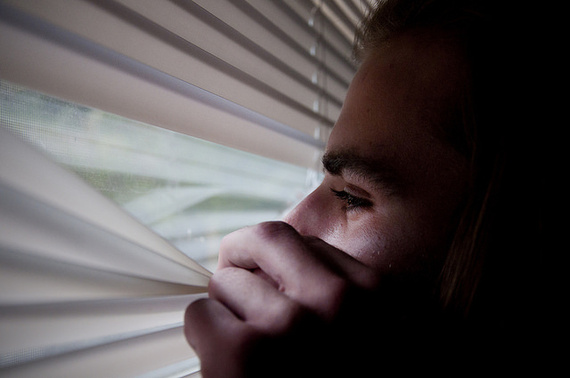In many ways, anxiety is a healthy response to an external stimulus. We should be in a heightened or aroused state when we give a speech, fly in a plane during times of intense turbulence, or encounter a potential threat from a neighbor's Rottweiler who has broken lose from their yard. Typically, when the stressful event is over, we expect to return back to physiological balance... and most of us do.
Anxiety becomes a problem when it spills over into our everyday lives. For a person with an anxiety disorder normal tasks like going to the grocery store or even leaving the house can feel like an insurmountable challenge. For those who suffer from constant fear, worry, or panic, normal situations in their external environmental can be perceived to be as threatening as facing off with a grizzly bear. With clinical anxiety, the person's body is actually producing the same chemical reaction as if they were in a very dangerous encounter with a hungry animal. The reality though, is that there is no real threat.
A series of repetitive, highly charged, emotionally stressful events that occur in a person's life within a short time frame could turn on the body's stress response over and over again. When the stress response is turned on and can't turn off, the body's survival mechanisms are activated and can stay that way for long periods of time. When someone lives in survival mode, they are living in a state of emergency, and are continually prepared for peril. The brain and body are always highly aroused.
Here is where things can go from bad to worse. In preparation for the next perceived threat, a person will think about some future worst-case scenario -- based on a specific past memory -- and will emotionally embrace it with such focus and concentration, that their body begins to believe that it is living in that future reality in the present moment. Why? Because the body is the unconscious mind. It does not know the difference between an actual experience in life that creates an emotion or when an emotion is created by thought alone. As a result, the body can get knocked out of homeostasis just by thinking.
It is the redundancy of this process that conditions the body to become the mind of fear. In other words, anxiety is now subconsciously programmed into the body. In fact, when someone falls prey to a panic attack, they can try to control it with their conscious mind, but because it has been programmed into the body subconsciously, they have no ability to stop it because their body has literally become the mind of anxiety.
The physiology of an anxiety attack can be quite terrifying. Indeed, increased heart rate, shallow or labored breathing, excessive sweating, dizziness, and the feeling of detachment convince a person they are in mortal danger. When this happens the sympathetic branch of the autonomic nervous system is turned on and has taken control.
Since anxiety attacks are a byproduct of hyper-vigilance -- of constant preparation for the next stressful experience -- then is it possible to reverse the process and teach a individual, through meditation, to become conscious of their subconscious or unconscious thoughts and feelings related to an imagined horrible outcome? If the purpose of meditation is to get beyond the analytical mind in order to move from the conscious mind into the subconscious mind, then is it possible to change the program? What if a person was taught how to settle the brain and body into the present moment over and over again? By living in the present moment even for 20-30 minutes at a time, shouldn't the body (as well as the brain), start to feel safe, more relaxed, and ultimately more balanced?
Is it also possible to then recondition the body to a new mind? To the mind of peace or joy... just by doing the exact same process that created the anxiety? In other words, what if a person selected a new future healthy or joyful experience and emotionally embraced that future with the same passion that created the anxiety in the first place? Over time, could their body begin to be conditioned to believe that it is living in that future scenario and subconsciously become the mind of joy?
So many people in our community around the world who have practiced meditation have healed themselves from both anxiety and depression just by that very process.
Image courtesy of Hunger McGinnis is licensed under CC 2.0
